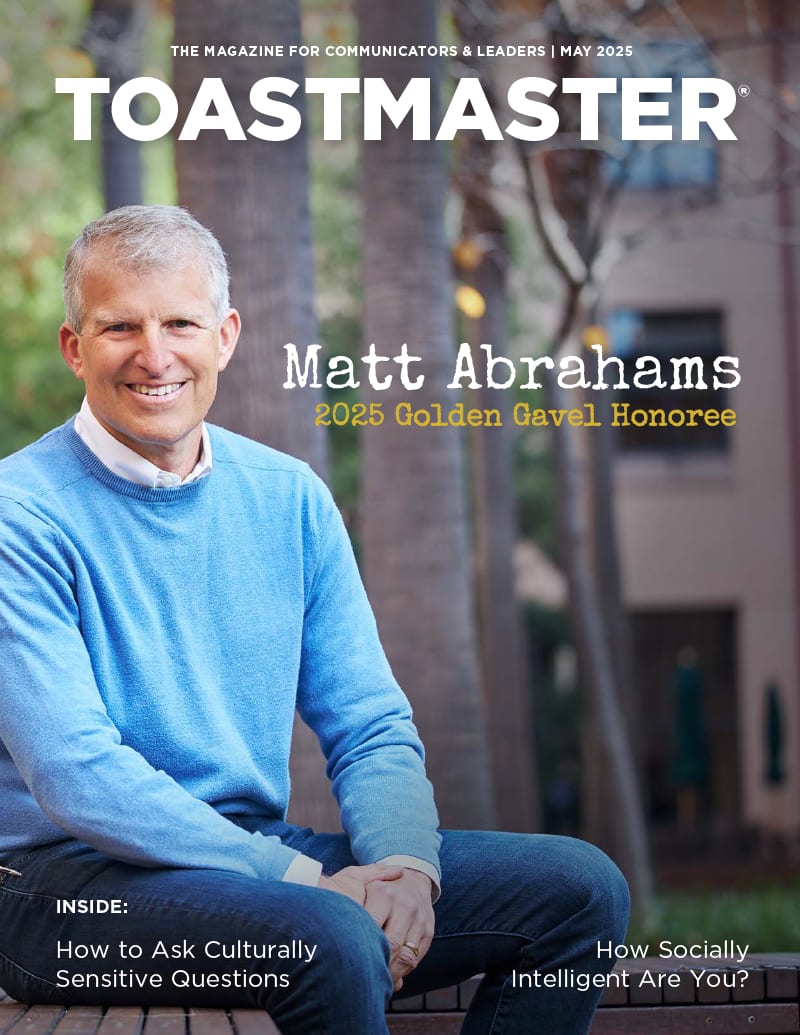
If you want to strengthen your speaking, listening, evaluation, and leadership skills, and help members and your club all at the same time, look no further than the General Evaluator position. This meeting role can maximize club effectiveness and meeting impact, yet it is often underutilized and undervalued.
Helping Individuals
The General Evaluator’s main job is to review and assess the club meeting—from the time people arrive to the end of the program’s educational component—and report their findings. The general evaluation should highlight how members have performed in their meeting roles, including preparation, organization, timeliness, enthusiasm, and carrying out the duties themselves.
“General Evaluators help individuals improve their speaking and leadership skills by providing motivating, structured, and specific feedback,” says Lynne Cantor, DTM, from Excalibur Speakers in London. “They should offer commendations and recommendations on what and why something came across well or didn’t.”
That means the General Evaluator must understand each of the meeting roles to provide an accurate assessment and meaningful suggestions. “I’ve sat through so many General Evaluator reports when I waited to hear where I could improve [in my meeting role] but didn’t hear anything,” says Cantor. “I know I can improve.”
Examples of the type of specific feedback that can be offered:
- The transitions from the Toastmaster of the meeting and/or the Table Topicsmaster were well-paced, or too long and rambling.
- The Toastmaster of the meeting did or did not introduce the speakers effectively to prepare the audience.
- The grammarian presented a word of the day that helped members learn or was too difficult or obscure.
The General Evaluator also ensures evaluators are offering feedback to speakers according to the objectives in the speaker’s particular Pathways project. The General Evaluator should only add to a speech evaluation if an evaluator didn’t provide a relevant and motivating assessment highlighting a speaker’s strengths and offering specific ideas for improvement.
Leading the Evaluation Team
In most clubs, the General Evaluator also manages the evaluation section of club meetings. That means overseeing the evaluation team: the speech evaluators, timer, grammarian, Ah-Counter, and Table Topics evaluator, if the club has one.
“The opportunity missed most by General Evaluators is the ability to take charge of the evaluations—tell the evaluators what’s required of them and set the tone of the evaluations before the meetings,” says Adrian Watts, DTM, who belongs to several clubs in the Perth area of Australia.
Some clubs don’t use the role as much as other clubs. In some cases, the Toastmaster of the meeting oversees the evaluation team, or clubs combine the Toastmaster and General Evaluator roles—or don’t use the latter position at all. That, too, is a missed opportunity, says Cantor. “Some people say, ‘It doesn’t matter if we don’t have a General Evaluator,’” she explains. “Of course it matters. Individuals and clubs miss out on valuable feedback that can enhance leadership and speaking skills.”
Helping Clubs
The General Evaluator’s report can also assess meeting structure and protocol, and how well members have fulfilled club responsibilities. This perspective offers a big-picture view of club performance to ensure members are learning, meetings are efficient and effective, and the club is thriving.
For example, Cantor knows of one club where no one greeted guests at the door. “This was picked up on by several General Evaluators, and now the club has an official ‘meeter and greeter,’” she says. “It makes a difference how the club is perceived.”
"The goal is not to be perfect by the end. The goal is to be better tomorrow."
—Simon SinekIn the I’m Just Sayin’ Club in Englewood, Colorado, earlier this year, a General Evaluator offered recommendations to help the club engage more members at meetings. During a St. Patrick’s Day-themed Table Topics session, the Topicsmaster asked for volunteers and selected three people who had raised their hands. During his report, the General Evaluator highlighted the fact that the three members were regular, enthusiastic contributors. He noted that while it was always fun to hear them speak, it’s important for Topicsmasters to call on and encourage members who don’t speak as often. That way, more members benefit from the impromptu speaking practice, and club engagement increases.
One way to boost the quality of feedback and obtain new perspectives is to schedule a member from another club to serve as a General Evaluator. This provides an unbiased, independent view and can offer new ideas to the club or confirm it’s following best practices.
Maximizing Opportunities
Some members don’t capitalize on the chance to serve in the role. “People are often threatened by the General Evaluator role,” says Zoya Mabuto-Mokoditoa of the Social Network Toastmasters Club in Johannesburg, South Africa. “It feels too big, some say. And it is big, but so is the learning opportunity that comes with taking it on.”
Here are some tips for both individuals and for clubs to ensure the role is afforded the opportunity to be successful and offer impact:
Individuals
- Use the Toastmasters General Evaluator checklist.
- Review A Toastmaster Wears Many Hats, a free resource from Toastmasters International that outlines the expectations and duties of each meeting role.
- Serve as a speech evaluator before being General Evaluator.
- Offer reports identifying specific issues and suggestions.
Clubs
- Have a General Evaluator run the meeting’s evaluation section.
- Schedule ample time for a robust General Evaluator report.
- Ask members outside the club to fill the role occasionally.
Serving as the General Evaluator helps develop your speaking, listening, evaluation, and leadership skills. The role also helps other members and the club itself grow. So challenge yourself, and sign up to be the General Evaluator today!
Jennifer L Blanck, DTM is a member of 5-Star Toastmasters Club in Arlington, Virginia, and AAMC Toastmasters in Washington, D.C., and a regular contributor to the Toastmaster magazine. Learn more at jenniferlblanck.com.




 Previous Article
Previous Article

